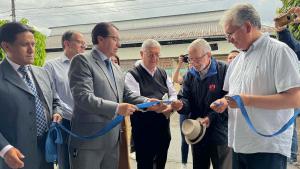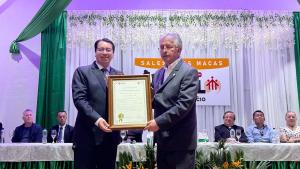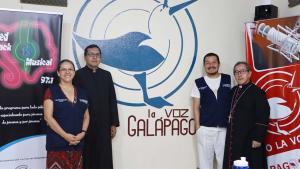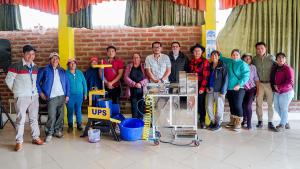Noticia
Planning from the perspective of John Friedmann
The General Director of the School of Industrial Organization of Spain (EOI) and professor at Universidad Politécnica de Madrid (UPM), Adolfo Cazorla, chose Universidad Politecnica Salesiana as the venue for the presentation of the book "Model of decentralization and territorial cohesion. The thought of John Friedmann in a postmodern context ".
The book collects the research work and the application of the results obtained over almost 20 years of Cazorla's work and the GESPLAN research group on planning; highlighting how it constitutes a tool to relate the forms of knowledge with the action. The book has a special dedication to Professor John Friedmann with whom Cazorla could collaborate on different occasions.
The event, held in the university's branch campus in Cuenca, began with a speech given by Javier Herrán, President of the university, who spoke about the Regional Investment and Services Program of the Community of Madrid (PRISMA), a planning model based on the social learning that has been applied for years in Spain, developed and applied by the authors of the book.
.
Then, Juan Ignacio de los Ríos, professor at UPM and researcher of the GESPLAN group, made a brief review of the book, referring to the work done with Cazorla, showing how John Friedmann presents planning as "a set of methodological resources for construction rational future scenarios different from the foreseeable as inertial projections of a starting situation, "he said.
Cazorla presented the book in three chapters. The first constitutes a historical and current review of planning in Spain, where the different types and models are analyzed with the concept of planning. The second chapter is a historical review of planning in Spain since the eighteenth century, a time considered as the beginning of a new stage by the change dictated by the new regional policy focused on the correction of territorial imbalances. In the third chapter, planning is studied from a broad perspective following the entry of Spain into the European Union, highlighting the birth of a common regional policy with community economic instruments and new processes.
Contenidos Relacionados
Contenidos Relacionados
Noticias Relacionadas
Noticias Relacionadas





Follow us
Follow us